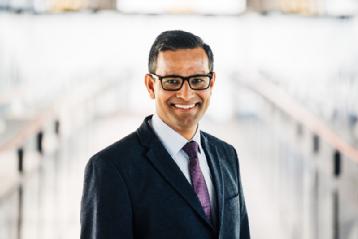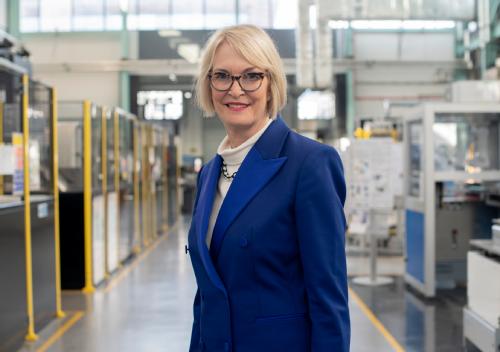WMG News - Latest news from WMG
WMG remembers Ratan Tata
Professor Robin Clark, Dean of WMG, comments on the passing of Ratan Tata

“Ratan Tata was a titan of business who will be remembered at WMG for his inspirational passion for engineering and design, and for his personal kindness, humility, and deep insight.
“A close friend of our founder, Lord Bhattacharyya, Mr Tata visited WMG, at the University of Warwick, many times.
“Whether opening the WMG Academy for Young Engineers in Coventry, meeting our researchers on materials and intelligent vehicles, laying the foundation stone for the National Automotive Innovation Centre, or meeting local engineering businesses to understand their capabilities, Mr Tata was always fascinated by the ways innovation and technology could improve lives and create opportunity, and always willing to give his time to speak to our students, researchers and industry partners about their work.
“WMG and Mr Tata’s partnership began during the development of the Tata Indica, India’s first domestically designed vehicle, with WMG researchers supporting the design and manufacturing of the groundbreaking car. This led to the opening of the Tata Motors European Technical Centre at Warwick and to many research and education partnerships across a wide range of industries, many of which continue to this day on our campus, including at the National Automotive Innovation Centre, helping to create jobs, develop technologies and strengthen communities.
“Mr Tata’s vision and leadership leaves an enormous legacy for Warwick, our region, the UK and the world.
We are greatly saddened by his passing, and our deepest condolences go to his family, friends and the entire Tata community.”
Expert comment on the Regulatory Innovation Office from Professor Siddartha Khastgir
Professor Siddartha Khastgir, Head of the Safe Autonomy Research Group at WMG, University of Warwick, comments on the announcement of the Regulatory Innovation Office.
Professor Khastgir said: “The creation of the Regulatory Innovation Office (RIO) by the government is welcome. It’s good to see recognition that regulation can be used for implementing innovation and supporting the UK to be at the forefront of global science and technology.
“I hope the RIO will draw on learnings between the various transport domains (land, air, and marine) to develop timely regulations for cross-cutting developments like connected and autonomous technology, and AI. WMG’s cross-domain safety assurance framework will provide scientific evidence that can support the RIO’s policymaking.
“I also urge the RIO to prioritise sector-specific regulations, especially in areas such as self-driving technology. This will enable developers to work from a more concrete set of requirements to develop the technology safely.”
The establishment of Skills England: Expert comment from Dr Ben Silverstone
Expert comment, from Dr Ben Silverstone, Workforce Transformation, Skills and Policy Lead at WMG, University of Warwick, on the establishment of Skills England
“WMG welcomes the formal announcement on the establishment of Skills England. A combined approach from the Government, education providers and employers is, without a doubt, the best way of ensuring that the skills system is fit for purpose. The decision to appoint a non-governmental chair should also be applauded and will ensure the needs of industry and the workforce are placed before policy pressures.
“To make the most of this opportunity we encourage the Government to consider the following key issues:
- Everyone, regardless of age; background or employment status, must have the best opportunities in terms of education - this is critical to the future prosperity of our society
- There must be an equal, if not greater, focus on upskilling and reskilling those already in employment
- We must learn from the Apprenticeship Trailblazer model, and focus on the skill enablers of our economy rather than the narrow interests of a traditional sectoral led approach
- Finally, we strongly urge Government to ensure the balance between a nationally conceived strategy, a regional contextualisation and high-quality local delivery is not lost.”
Skills England: Expert comment from Dr Ben Silverstone
Expert comment from Dr Ben Silverstone, Associate Professor, Workforce Transformation Strategy and Policy at WMG, University of Warwick
 “WMG welcomes the establishment of Skills England as a body to simplify and accelerate the skills system in the UK. As our economy is transformed, over the coming decades, the relationship between industry, education and government is critical in ensuring that the immediate needs of industry are met. Hand in hand with this, the further devolution of skills budgets to local areas will be essential in ensuring that place specific provision can be brought to bear, in a funded capacity, where businesses require support to meet local needs as part of a regional and national strategy.
“WMG welcomes the establishment of Skills England as a body to simplify and accelerate the skills system in the UK. As our economy is transformed, over the coming decades, the relationship between industry, education and government is critical in ensuring that the immediate needs of industry are met. Hand in hand with this, the further devolution of skills budgets to local areas will be essential in ensuring that place specific provision can be brought to bear, in a funded capacity, where businesses require support to meet local needs as part of a regional and national strategy.
“Investment in the further education system is much needed, and represents a critical, and widespread, recognition of the role that it plays in supporting businesses. The commitment to supporting young people is vital, but this does not go far enough.
“There is also a huge number of employees in the workforce in need of re skilling and upskilling - it is critical that the role of further education is not diminished in this capacity. We call upon the Government to make colleges bastions of industrial capability through skilling the existing workforce.
“Finally, the Apprenticeship Levy is in desperate need of change. We welcome commitments to expand its use. Enabling businesses to spend their levy contributions on impactful training, alongside high-quality apprenticeships, will increase investment in the workforce and prevent valuable funding from disappearing from the skills landscape where it goes unspent. We urge the Government to go further, and to allow levy paying organisations to transfer up to 100% of their unspent levy into their supply chain to support an integrated approach to capability development, helping to anchor industry in the UK.”
King’s Speech: Expert comment from Simon Webb
Expert comment from Simon Webb, Chief Technology Officer, at WMG at the University of Warwick
 "The announcements in the King’s Speech of a new industrial strategy, supported by a revived Industrial Strategy Council and devolved local growth plans, demonstrate a welcome commitment to growing the UK economy through long-term innovation, increased infrastructure delivery and building economic opportunity across the whole country.
"The announcements in the King’s Speech of a new industrial strategy, supported by a revived Industrial Strategy Council and devolved local growth plans, demonstrate a welcome commitment to growing the UK economy through long-term innovation, increased infrastructure delivery and building economic opportunity across the whole country.
"The support for 'sustainable growth by encouraging investment in industry, skills and new technologies' will be vital for UK economic success in key areas such as the decarbonisation of future transport and advanced manufacturing.
"As it looks to develop the Industrial Strategy, the government will need to consider the current needs of businesses and address their real world challenges. This is particularly important for SMEs and microbusinesses who may need additional support to improve their productivity and sustainability. The announcement of local growth plans and an Industrial Strategy Council are welcome steps to engaging with business on these issues.
"At WMG, we look forward to working with government and our industry partners to help deliver on these vital missions."
Expert comment from Dr Harjinder Lallie on the London hospitals cyber attacks
Dr Harjinder Lallie, Associate Professor (Cyber Security) at WMG at the University of Warwick explain: “The London cyber attack demonstrates the importance of cyber defences and proper back up plans, especially in organisations where it really can be a matter of life or death, like the NHS. With hospitals now having to resort to paper records in the wake of the attack, we must seriously weigh up the costs of defending ourselves versus the cost of doing nothing and accepting these attacks from hostile actors.
“With these attacks often able to manipulate our data as well as hold it to ransom, our most private data – such as our health records – must be protected more closely. To leave the medical information of patients out there without proper cyber security defence is the equivalent of leaving the files on a park bench or on a train. We must invest more in our own defences if we don’t want to see these types of attacks repeated time and again.”
Professor Alok Choudhary: Impact of the Red Sea crisis on global supply chains
 Expert comment from Professor of Supply Chain Management, Alok Choudhary.
Expert comment from Professor of Supply Chain Management, Alok Choudhary.
“The ongoing Red Sea crisis might have far-reaching consequences on the global supply chain, trade, and economic dynamics. Serving as the shortest sea route connecting Asia and Europe, the Suez Canal transports 17,000 ships annually, representing 12% of the world's total trade volume and $1 trillion worth of goods.
“The implications of this disruption on trade are significant. Rerouting ships an additional 3500 nautical miles is expected to result in significant delays, causing logistical challenges for major companies. The increased shipping and logistics costs incurred due to longer travel times are likely to be passed on to consumers, leading to a potential spike in prices for a wide array of goods, from everyday consumer items, oil and gas to crucial components for industries such as automotive and manufacturing.
“The ripple effect on production cycles is a cause for concern, as delays in delivering key components may lead to further disruptions. In particular, the automotive and consumer goods industries may face challenges in maintaining production schedules if crucial components do not reach their destinations on time.
“One of the most immediate impacts could be felt in the oil market, with potential consequences for global oil prices. The disruption in the timely transportation of both refined and crude oil through the canal may contribute to an increase in oil prices. This could have a cascading effect on economies, particularly in regions heavily reliant on oil imports, and may be reflected at fuel pumps worldwide.
“Here in the UK, the rise in oil prices could pose a challenge to economic stability and may halt falling inflation. Higher shipping and logistics costs, coupled with potential delays in the delivery of goods, might contribute to inflationary pressures. This could have broader implications for the UK economy, impacting consumer spending and overall economic growth.”
Read more about Supply Chain research at WMG here: https://warwick.ac.uk/fac/sci/wmg/research/research-areas/supply-chain
Mark Urbanowski, Principal Engineer, responds to the Government’s proposed cuts to active travel funding budgets
 Expert comment from Mark Urbanowski.
Expert comment from Mark Urbanowski.
Mark Urbanowski, Principal Engineer at WMG at the University of Warwick, said: “Travelling around the UK’s towns and cities is getting increasingly congested, polluted and unsafe. A key part of the solution to this problem, along with helping reach the UK’s Net Zero goal, is getting people and goods moved in efficient and clean vehicles, correctly sized for the journey, passenger and job requirements.
“Active travel, walking and cycling, as well as emerging micromobility transport options like e-bikes, e-cargo vehicles and e-scooters, need the right infrastructure to make them convenient and safe to use. Without investment for infrastructure and integration into the broader public transport system, modal shift to these vehicle types; by commuters, families and businesses; will languish behind the rest of Europe. It’s an issue we will be addressing at our Micromobility event in May.”
Margot James, Executive Chair, comments on the Government’s new Net Zero Strategy
Expert comment from Margot James, Executive Chair at WMG, in response to the Government’s Net Zero Strategy.

"The decarbonisation of personal transport, by moving to Electric Vehicles (EVs), will be a major contributor to delivering on this target as EVs become a viable option for the majority of consumers. Viability depends upon EVs being affordable and drivers having access to a reliable network of fast charging in urban and rural networks"
UK Government Net Zero Strategy
Find out more about the new National Skills Framework that has been created by WMG, The Faraday Institution and the High Value Manufacturing Catapult: New National Electrification Skills Framework and Forum could put the UK at the forefront of the green revolution News
Dr Ben Silverstone comments on the Government’s new Net Zero Strategy
Expert comment from Dr Ben Silverstone, WMG’s National Electrification Skills Framework and Forum Programme Lead, in response to the Government’s Net Zero Strategy.
“We welcome the Government’s Net Zero strategy and the commitment to reform the skills system to allow providers to be more responsive to industry need, which is what we have called for in the recently launched National Electrification Skills Framework. Our focus is to re-skill, up-skill and new-skill working with the automotive sector to ensure their workforce has the necessary skills to be able to meet the 2035 and 2050 targets set by government.”
Find out more about the new skills framework that has been created by WMG, The Faraday Institution and the High Value Manufacturing Catapult here: New National Electrification Skills Framework and Forum could put the UK at the forefront of the green revolution - WMG :: News (warwick.ac.uk)

